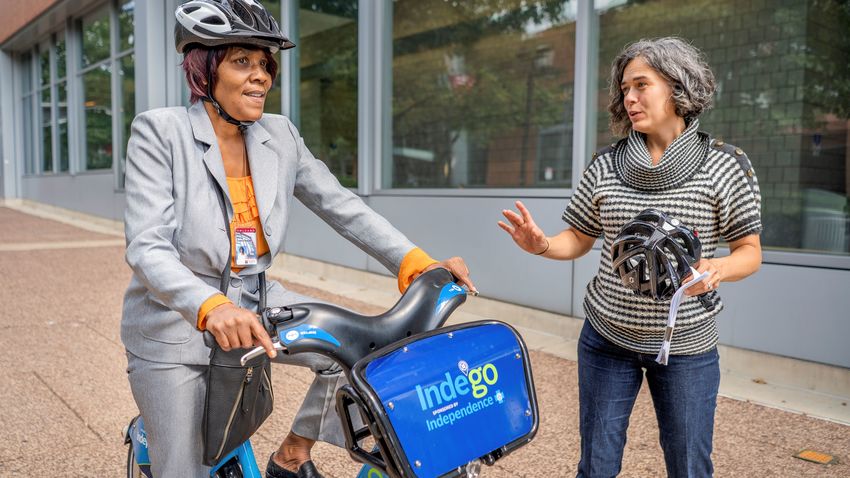
Investigators with the Temple University Collaborative on Community Inclusion have received more than $10 million in new federal funding, confirming the Collaborative as a major national center for research and interventions to support participation of people with serious mental illnesses (SMI) in activities in their communities to improve their health.
The new funding includes $4.375 million to continue for five more years as a research and training center focusing on independent living and community participation of individuals with SMI. This marks the fifth such five-year grant for the Collaborative. In addition, Collaborative investigators received a second RRTC grant, also for $4.375 million, to co-create a center focusing on transition-aged youth with SMI.
Collaborative investigators also have received three $600,000 Field Initiated Project (FIP) grants to conduct studies in specific populations. The funding, totaling $10.55 million, comes from the National Institute on Disability, Independent Living, and Rehabilitation Research (NIDILRR).
“It recognizes the importance of the work that we've been doing,” says Gretchen Snethen, associate director for the Collaborative and an associate professor in the College of Public Health’s Department of Health and Rehabilitation Sciences. “We emphasize the idea that community participation is a medical necessity, not a secondary consideration, for people with mental illnesses. Often there's a focus on symptom reduction or medication management, but engagement in diverse activities and social situations can reduce some traditional symptoms of mental illness.”
“To have two federally funded centers associated with the Collaborative, and then the other funding—that in itself is a big deal and a great affirmation of the approaches that we take,” says Mark Salzer, professor of social and behavioral sciences and the Collaborative’s director.
The newly funded RRTC is designed to support community living and participation among transition-aged youth with SMI, between ages 14 and 26, who come from marginalized or disadvantaged backgrounds. It also is receiving funding from the Substance Abuse and Mental Health Services Administration (SAMHSA). It is a partnership between the Temple College of Public Health and the University of Massachusetts Chan Medical School.
“The Collaborative has traditionally focused on supporting the community inclusion and participation of adults with psychiatric disabilities. UMass brings expertise in the transition to adulthood, particularly in the areas of education and employment,” says Elizabeth Thomas, assistant professor in the Department of Social and Behavioral Sciences, who is co-leading the new center with Kathryn Sabella of UMass Chan Medical School. “One exciting aspect associated with the development of this new center is that we've been able to establish new partnerships within and outside of Temple. We’ve connected with colleagues in political science and criminal justice, and with the Institute on Disabilities here at Temple. We'll all be working on projects together.”
The three newly funded Field Initiated Projects are each three-year studies exploring specific issues:
-
Snethen is studying diabetes, physical activity and dietary behaviors among people with serious mental illnesses. Participants in the study will respond to mobile phone surveys to indicate their activities around diet and physical activity, including self-reports of cravings, what they have eaten, and whom they are with. Accelerometers and phone GPS systems will measure their activity. “We’re excited to see how momentary experiences might impact diet and physical activity. Looking forward, we want to see how this information can be used to inform the development of a peer-facilitated intervention,” Snethen says.
-
Salzer is working with postdoctoral fellow Crystal Slanzi on a study called “Getting Out of The House.” It will examine “precursor behaviors” that may inhibit people with SMI from getting out into the community. “Are they even getting out of bed? Are they sitting on their stoop?” Slanzi asks. “We hope to develop an intervention to target people who might be having difficulty with those precursor behaviors, to get them activated. If they're not getting out of bed, the goal is to get them to get out of bed for five minutes, once an hour. If they are sitting on their couch all day, it might be to get them to sit on their stoop for five minutes, once an hour.” The study will employ coaching sessions, self-reports and phone GPS measurement.
-
Salzer and Wei Song, a former postdoctoral fellow at the Collaborative who is now at the A.J. Drexel Autism Institute, are studying community mobility and participation among autistic adults. “We want to find out how their environment supports or hinders them from participating in the community the way they want to participate,” Song says. The study will examine how mobility and participation relates to the accessibility of nearby resources and services. “Do they have a gym? Do they have a park? Do they have grocery stores? If they have those facilities, they're more likely to go out and do things,” Song says.
The TU Collaborative, based within Temple’s College of Public Health, has a mission to target obstacles that prevent people with psychiatric disabilities from fully participating in their communities and to expand their opportunities to participate as active and equal community members. In its 20 years, the Collaborative’s research has been published in hundreds of journal articles and cited thousands of times. The Collaborative also has created more than 170 tool kits, manuals and resources for researchers, policy makers, consumers, and health care providers, on the subject of community inclusion and mental health, that have been downloaded nearly 500,000 times.
